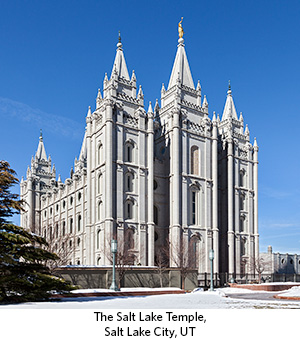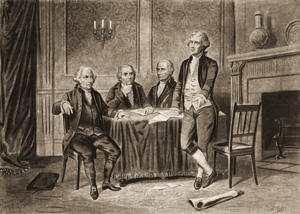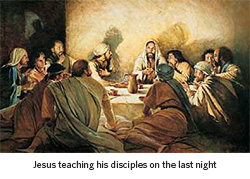When I was attending seminary in the mid-1980s, my dad approached me one day and asked if I would like to meet the President-Prophet of The Church of the Latter-day Saints, Ezra Taft Benson. I said I would love to. At the time, my dad was doing consultant work for the Mormon Mountain Health Care System in Utah. The leaders of this healthcare system knew I was studying theology, preparing to become a minister. Eventually, my fellow seminarians caught wind of this unusual invitation. Before I knew it, the entire seminary campus was praying for me as I prepared to fly to Salt Lake City and make the acquaintance of such an important leader in our country. Mormons are not mainstream Christians by any means; therefore, I was curious to discover more about their unique set of beliefs, in addition to their novel role in American history. And, perhaps most important, it was a special time for me and my dad to spend quality time together, sharing our common faith along the way.

Before visiting Ezra Taft Benson in his office, I was given a grand tour of the Salt Lake City Temple Square. I was fascinated by the many different buildings of the Mormon Church. Towards the end of the tour, I was ushered into the large, central Masonic Temple of Salt Lake City. My assigned guides cheerfully informed me that I was about to see certain parts of the temple that ordinary tourists were not allowed to view. That comment alone made me curious about Mormon theology – that only special people could see special things. I remember being escorted behind large curtains and partitions and eventually entering an area where only couples getting married in the Mormon faith could visit. My guides smiled at me, in effect telling me how special my dad and I were to them. When I asked if I could go behind one last partition to view a large room I could see in the distance, they turned to me, and abruptly said, no, only committed members of the Mormon Church could occupy those areas. Immediately, I thought of the many teachings of Jesus that railed against religious rules and regulations which promoted the slightest hints of secrecy, exclusivity, power, or hierarchy.
After the tour, I met up again with my dad who had been doing his consulting work most of the morning. It was time now to meet Ezra Taft Benson, the President and Prophet of the worldwide Mormon Church. We made our way across the Temple Square, entered a large office building, and rode the elevator to the top floor. We were ushered into a large meeting room for special guests of the Mormon Church. The President-Prophet of the Mormon Church has 12 Apostles who help him manage the entire operation of their international presence. A few of those Apostles were in the room sitting next to the leaders of the Mountain Health Care System and my dad. It was unbelievable they were all assembled to meet just me and my dad. However, I knew that for years my dad had helped them improve their health care system throughout the world. They were expressing their gratitude to him and being exceedingly gracious to meet me as well. After much chatting and getting to know each other, I found myself face-to-face with Ezra Taft Benson.
I knew the question I wanted to ask him; therefore, I jumped right in. I inquired whether the Church of the Latter-day Saints ever did mission work together with other Protestant, Orthodox, or Roman Catholic churches. He never directly answered the question, but I pretty much already knew the answer. Mormons very rarely cooperate with other churches providing Christian witness and service together for their surrounding communities or the world. They like to operate alone and separate for the most part. Their basic theology is noticeably different from traditional Christianity in many significant ways. For instance, they do not believe in the Trinity – God being expressed equally in three persons, Father, Son, and Holy Spirit. They believe that a Book of Mormon written by their founder, Joseph Smith, is on par with the authority of the Bible. Mormons teach that the only true guarantee of salvation and a future afterlife is achieved through an active membership with the Mormon Church. Mormons are warned never to leave the Mormon Church. If they do, their salvation and eternal life will be in jeopardy. Mormons are taught from an early age that they are either in their Church or they are out; there is no middle ground.
Our cordial meeting could not have ended on more friendly terms. We learned much about each other’s traditions, I being Presbyterian. I even wrote Ezra Benson a follow-up letter saying that if Mormons ever changed their minds and felt the inclination to pursue joint mission work together with other Protestant denominations, I would be more than honored to help facilitate such a process. I never did hear back from him or any of the other Mormon leaders I met, which was not a total surprise.
During the final night when Jesus was with his disciples, before he was arrested and crucified, he taught them to be unified in everything they did. He asked them to be wary about anything that could potentially come between them. From his divine perspective, Jesus knew his followers would eventually form different denominations and go different ways, but he encouraged them to remain united together as best they could no matter how different their doctrinal differences might become. Churches of different backgrounds, yet united in Christ, are a powerful witness for the world. For these reasons, Jesus said, “I am praying not only for these disciples but also for all who will ever believe in me through their message. I pray that they will be one, just as you and I are one – as you are in me, Father, and I am in you. And may they be in us so that the world will believe you sent me…May they experience such perfect unity that the world will know that you sent me and that you love them as much as you love me.” (John 17:20,21,23b)
Jesus was all about freedom as well as unity. All he ever wanted was for people to believe in him and follow him wherever in the world he was going. He abhorred extra rules and regulations of any religion which constrained and eventually choked its members to death. As the Scriptures tell us, churches and church leaders should humbly point people to Jesus, not to themselves for any worldly gain or power. When churches go astray and begin to develop their own rules and regulations apart from the teachings of Jesus, they often become cults, exclusive societies, and a burden instead of a blessing to the world. In my mission circles, I have been taught to recognize unhealthy or cult-like characteristics of a church. A cult has some of the following characteristics: 1. A leader who claims to be divine. 2. Rejection of other churches. 3. Leadership which does not tolerate honest questions; among many other characteristics.

One of the most cherished laws we enjoy in the United States is our freedom of religion. If we ever lose sight of that right or privilege, we will be pursuing a dangerous and radical departure from our cherished heritage. Our federal government should never impinge on the rights of religions to practice what they believe, provided they do not break any laws in our country. Hopefully, we will never vote for a candidate who espouses a religion taking over our country, forming a theocracy, or promoting a government that restricts the freedom of any religion wishing to fully express itself in a lawful and respectful manner. Jesus never forced himself or his teachings on anyone. He taught with amazing authority, helping the most vulnerable people in his society. He gave his listeners complete freedom to either continue following him or walk away and follow someone else. He kept things super simple, above board, with no secrets among the privileged few. He asked only that we believe in him as Messiah, Savior and Lord, and that we adhere to two golden rules: 1. Love God with all our hearts, minds, and souls, and 2. Love our neighbor as ourselves.
Yet, following these requirements for the followers of Jesus can at times prove quite daunting. They can put disciples in direct confrontation with their surrounding culture. For this reason, during Jesus’s earthly ministry, some of his followers began to leave him, thinking it was becoming too costly to continue following him. However, those who remained committed to him enjoyed the blessings of being in God’s will, helping form the beginnings of the First Century Church. The original disciples and apostles were convinced they had found the source of all life, wisdom, truth, freedom, and purpose. The Bible tells us, “At this point many of his disciples turned away and deserted him. Then Jesus turned to the Twelve and asked, “Are you also going to leave?” Simeon Peter replied, “Lord, to whom would we go? You have the words that give eternal life. We believe, and we know you are the Holy One of God.” (John 6:66-69)

Scripture tells us to be captive to only one thing: the love and grace of our Lord. If we allow ourselves to be ruled by any other set of human traditions, regulations, or power, we will become judgmental people wanting to be separate and above everyone else around us. We will become intolerant and convinced that only we alone are members of the best and most sacred club in town. And, if we go this route, away from a more unified response in our witness, we will drift farther and farther from the blessings, love, and wisdom of God.
I challenge you this week to reach out to a friend who has a completely different Christian background from your own, and ask them if there might be a way to work together for the sake of Christ’s kingdom in the world. Our world needs unity now more than ever before. The Lord will be with you.
